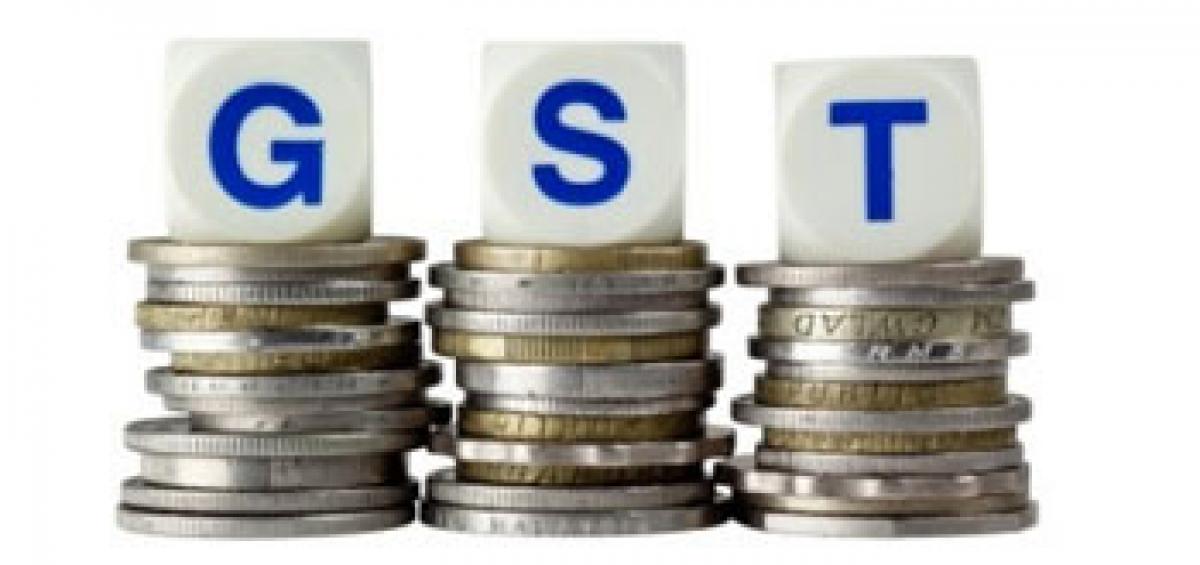Live
- Neha murder case to be handed over to CID
- Setback for Cong as polarisation of Lingayat votes may help BJP
- Huge protest rally in Haveri
- Video: Rashmika Mandanna connects with nature, soaks in waterfall on Earth Day
- Is Sreeleela set to star opposite Ajith in 'Good Bad Ugly'?
- 6 YSRCP activists injured in attack by TDP men
- More nominations filed on auspicious day
- Chandrababu participates in women's conference in Viziagaram
- The critical need for special education in preschools
- Loneliness is a reason for your late-night chocolate cravings says study
Just In

Despite political summit, a consensus on GST still eludes. The foremost concern is among certain states over possible revenue loss during the transition to GST.
 Despite political summit, a consensus on GST still eludes. The foremost concern is among certain states over possible revenue loss during the transition to GST. In interstate trade, the producer state does not get the GST collected from the end-user. The Centre proposes to compensate for the losses. But, an agreement is needed on the time period of compensation and the methodology used to arrive at the estimated loss for the states due to introduction of GST.
Despite political summit, a consensus on GST still eludes. The foremost concern is among certain states over possible revenue loss during the transition to GST. In interstate trade, the producer state does not get the GST collected from the end-user. The Centre proposes to compensate for the losses. But, an agreement is needed on the time period of compensation and the methodology used to arrive at the estimated loss for the states due to introduction of GST.
In the present system of taxation, each state can adopt its own priorities based on the political philosophy of the ruling party in that state and the specific aspects of the state’s social and economic outlook. The state governments today enjoy freedom to decide on what to be taxed and to what extent. Taxation is not just an accounting exercise. It’s an instrument of public policy to regulate consumption in a socially desirable manner.
But, in a GST regime, the state governments do not have much choice on the extent of tax revenue they plan to target. They also have little or no choice on the manner in which tax revenue has to be mobilised. This goes contrary to the federal character of Indian polity whether or not the intended GST has a fiscal rationale. But, these concerns are addressed to some extent in the proposed GST regime. For instance, petroleum products and alcohol for human consumption are excluded from the GST regime.
In fact, alcohol is one of the important sources of revenue for the states. But, the state governments are already collecting optimal taxes from these products leaving very little scope for further tax manoeuvering .Further, the state governments are constrained to levy any additional taxes on petroleum products though GST permits to do so because of inflation concerns and the direct impact such a measure would impose on common man. Thus the main concern is that the GST chokes the taxation choices for the states.
Still there is a way out. The states can represent to GST council on the GST rates on any particular commodity. The GST council comprises both the Centre and state governments. But, this process undermines the authority of an elected state government obliged to fulfill the people’s mandate. The GST council, a potpourri of governments led by conflicting political formations, prevails over an elected state government with a particular electoral mandate to serve.
While many countries follow a floor rate system for GST, the GST proposed in India is a uniform rate thus raising questions of political economy. Taxation also has a social philosophy associated with it. For instance, luxury consumption should be taxed more while the mass consumption should be taxed less and essential consumption should be free from taxation.
But as the critics of GST feel, the shift from the present system of multiplicity of commodity taxation rates to a GST regime of uniform taxation rate would be regressive as it rewards the affluent at the cost of the poor. Therefore, the so-called concept of revenue neutral GST is not politically neutral. Whether or not a political consensus emerges, these concerns need to be addressed in the interests of people.

© 2024 Hyderabad Media House Limited/The Hans India. All rights reserved. Powered by hocalwire.com







